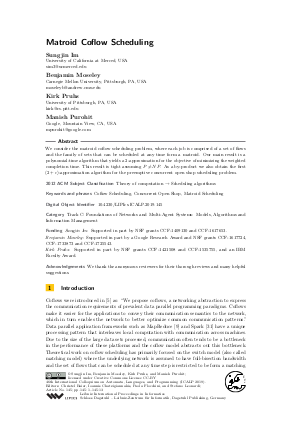@InProceedings{im_et_al:LIPIcs.ICALP.2019.145,
author = {Im, Sungjin and Moseley, Benjamin and Pruhs, Kirk and Purohit, Manish},
title = {{Matroid Coflow Scheduling}},
booktitle = {46th International Colloquium on Automata, Languages, and Programming (ICALP 2019)},
pages = {145:1--145:13},
series = {Leibniz International Proceedings in Informatics (LIPIcs)},
ISBN = {978-3-95977-109-2},
ISSN = {1868-8969},
year = {2019},
volume = {132},
editor = {Baier, Christel and Chatzigiannakis, Ioannis and Flocchini, Paola and Leonardi, Stefano},
publisher = {Schloss Dagstuhl -- Leibniz-Zentrum f{\"u}r Informatik},
address = {Dagstuhl, Germany},
URL = {https://drops.dagstuhl.de/entities/document/10.4230/LIPIcs.ICALP.2019.145},
URN = {urn:nbn:de:0030-drops-107213},
doi = {10.4230/LIPIcs.ICALP.2019.145},
annote = {Keywords: Coflow Scheduling, Concurrent Open Shop, Matroid Scheduling}
}

 Creative Commons Attribution 3.0 Unported license
Creative Commons Attribution 3.0 Unported license






























